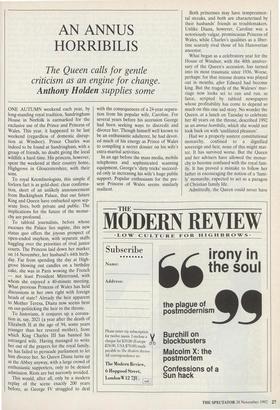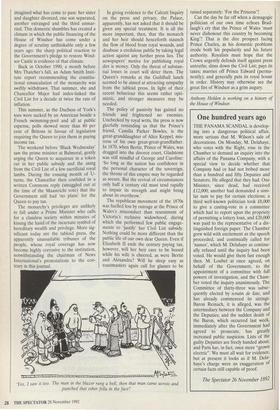AN ANNUS HORRIBILIS
The Queen calls for gentle criticism as an engine for change.
Anthony Holden supplies some ONE AUTUMN weekend each year, by long-standing royal tradition, Sandringham House in Norfolk is earmarked for the exclusive use of the Prince and Princess of Wales. This year, it happened to be last weekend (regardless of domestic disrup- tion at Windsor). Prince Charles was indeed to be found at Sandringham, with a group of friends, no doubt giving the local wildlife a hard time. His princess, however, spent the weekend at their country home, Highgrove in Gloucestershire, with their sons.
To royal Kremlinologists, this simple if forlorn fact is as gold-dust: clear confirma- tion, short of an unlikely announcement from Buckingham Palace, that our future King and Queen have embarked upon sep- arate lives, both private and public. The implications for the future of the monar- chy are profound.
To tabloid journalists, before whose excesses the Palace lies supine, this new status quo offers the joyous prospect of open-ended mayhem, with separate staffs haggling over the priorities of rival junior courts. The Princess laid down her marker on 14 November, her husband's 44th birth- day. Far from spending the day at High- grove blowing out candles on a birthday cake, she was in Paris wowing the French — not least President Mitterrand, with whom she enjoyed a 40-minute meeting. What previous Princess of Wales has held discussions in her own right with foreign heads of state? Already the heir apparent to Mother Teresa, Diana now seems bent on out-politicking the heir to the throne.
To historians, it conjures up a corona- tion in, say, 2021 (a year after the death of Elizabeth II at the age of 94, some years younger than her revered mother), from which King Charles III has banned his estranged wife. Having managed to write her out of the prayers for the royal family, he has failed to persuade parliament to let him divorce her. So Queen Diana turns up at the Abbey anyway, with a large crowd of enthusiastic supporters, only to be denied admission. Riots are but narrowly avoided.
This would, after all, only be a modern replay of the scene exactly 200 years before, as George IV struggled to deal with the consequences of a 24-year separa- tion from his popular wife, Caroline. For several years before his accession George had been seeking ways to discredit and divorce her. Though himself well known to be an enthusiastic adulterer, he had devot- ed much of his energy as Prince of Wales to compiling a secret dossier on his wife's extra-marital activities.
In an age before the mass media, mobile telephones and sophisticated scanning equipment, George's 'dirty tricks' succeed- ed only in increasing his wife's huge public support. Popular enthusiasm for the pre- sent Princess of Wales seems similarly resilient. Both princesses may have temperamen- tal streaks, and both are characterised by their husbands' friends as troublemakers. Unlike Diana, however, Caroline was a notoriously vulgar, promiscuous Princess of Wales, while Charles's qualities as a liber- tine scarcely rival those of his Hanoverian ancestor.
What began as a celebratory year for the House of Windsor, with the 40th anniver- sary of the Queen's accession, has turned into its most traumatic since 1936. Worse, perhaps: for that intense drama was played out in months, after Edward had become king. But the tragedy of the Waleses' mar- riage now looks set to run and run, as farce, scripted by tabloid newspapers whose profitability has come to depend so much on this one sad story. No wonder the Queen, at a lunch on Tuesday to celebrate her 40 years on the throne, described 1992 as an annus hornbills, which she would not look back on with 'undiluted pleasure'.
Had we a properly austere constitutional monarchy, confined to a dignified sovereign and heir, none of this might mat- ter. It has survived worse. But the Queen and her advisers have allowed the monar- chy to become confused with the royal fam- ily. It has proved a mistake to follow her father in encouraging the notion of a 'fami- ly' monarchy, expected to act as a paragon of Christian family life.
Admittedly, the Queen could never have imagined what has come to pass: her sister and daughter divorced, one son separated, another estranged and the third unmar- ried. This domestic shambles has created a climate in which the public financing of the House of Windsor has come under a degree of scrutiny unthinkable only a few years ago: the sharp political reaction to the Government's pledge to restore Wind- sor Castle is evidence of that climate.
Back in October 1990, a month before Mrs Thatcher's fall, an Adam Smith Insti- tute report recommending the constitu- tional emasculation of the monarchy was swiftly withdrawn. That summer, she and Chancellor Major had index-linked the Civil List for a decade at twice the rate of inflation.
This summer, as the Duchess of York's toes were sucked by an American beside a French swimming-pool and all at public expense, polls showed more than 80 per cent of Britons in favour of legislation requiring the Queen to join them in paying income tax.
The weekend before 'Black Wednesday' saw the prime minister at Balmoral, gently urging the Queen to acquiesce in a token cut in her public subsidy and the axing from the Civil List of a few sacrificial royal lambs. During the ensuing month of U- turns, the Chancellor then confided in a written Commons reply (smuggled out at the time of the Maastricht vote) that the Government still had 'no plans' for the Queen to pay tax. The monarchy's privileges are unlikely to fall under a Prime Minister who calls for a classless society within minutes of kissing the hand of the incarnate symbol of hereditary wealth and privilege. More sig- nificant today are the tabloid press, the apparently unassailable tribunes of the people, whose royal coverage has now become highly corrosive to the institution, notwithstanding the chairman of News International's protestations to the con- trary in this journal. In giving evidence to the Calcutt Inquiry on the press and privacy, the Palace, apparently, has not asked that it should be given any special treatment. It is all the more important, then, that the monarch and her heir should henceforth staunch the flow of blood from royal wounds, and disabuse a credulous public by taking legal action against any further press lies. The newspapers' motive for publishing royal dirt is money. Only the threat of substan- tial losses in court will deter them. The Queen's remarks at the Guildhall lunch seemed to be aimed at attracting sympathy from the tabloid press. In light of their recent behaviour this seems rather opti- mistic, and stronger measures may be needed.
The policy of passivity has gained no friends and frightened no enemies. Unchecked by royal writs, the press is now gleefully reminding us that the Prince's friend, Camilla Parker Bowles, is the great-granddaughter of Alice Keppel, mis- tress of his own great-great-grandfather. In 1870, when Bertie, Prince of Wales, was dragged into the divorce court, Gladstone was still mindful of George and Caroline: `So long as the nation has confidence in the personal character of the sovereign, the throne of this empire may be regarded as secure. But the revival of circumstances only half a century old must tend rapidly to impair its strength and might bring about its overthrow.'
The republican movement of the 1870s was fuelled less by outrage at the Prince of Wales's misconduct than resentment of Victoria's reclusive widowhood, during which she performed few public engage- ments to 'justify' her Civil List subsidy. Nothing could be more different than the public life of our own dear Queen. Even if Elizabeth II ends the century paying tax, however, will her heir care to be booed while his wife is cheered, as were Bertie and Alexandra? Will he sleep easy as toastmasters again call for glasses to be 'Yes, 1 saw it too. The man in the blazer rang a bell, then that man came across and punched that other fella in the face!' raised separately: 'For the Princess'?
Can the day be far off when a demagogic politician of our own time echoes Brad- laugh's cry that the Prince of Wales 'must never dishonour this country by becoming King'? That is the dire prospect facing Prince Charles, as his domestic problems erode both his popularity and his future authority. Royalists must hope that the Crown urgently defends itself against press untruths; slims down the Civil List; pays its taxes; marries off Prince Edward (perma- nently); and generally puts its royal house in order. History may otherwise see the great fire of Windsor as a grim augury.
Anthony Holden is working on a history of the House of Windsor.











































































 Previous page
Previous page